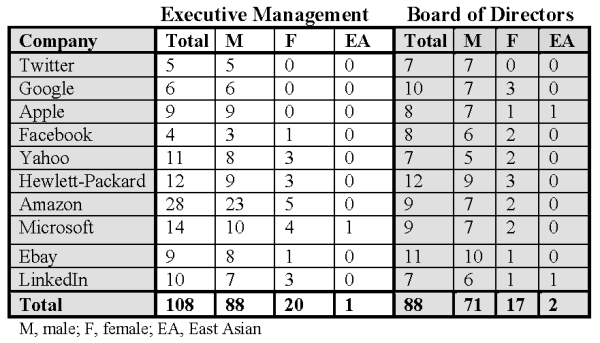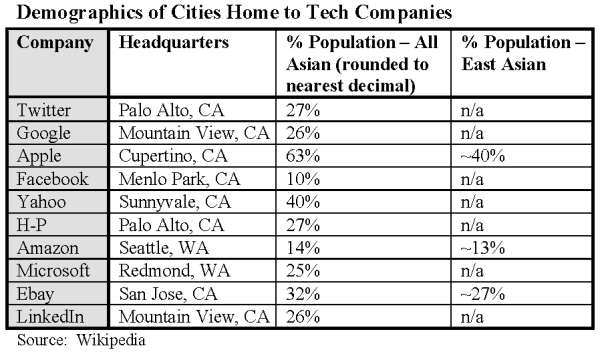by Leeland Lee
After its recent I.P.O. filing, Twitter provoked an outcry over the lack of women among its board of directors and senior management. Time Magazine declared that “Twitter’s all-male board spells failure,” while The New York Times pointed out that Twitter inadvertently exposed a more general problem—the lack of diversity in male-dominated board rooms in Silicon Valley.
Just how lopsided is the ratio of male-to-female leaders among the top software companies? A recent examination of various company profiles revealed that, not unexpectedly, women are indeed a rare species in upper management. But compared to women, the number of leaders of East Asian descent is even rarer—and by a wide margin. So where’s the outrage?
Among the trendiest tech companies in the Bay Area—Google, Apple, Facebook, Ebay, Yahoo, Twitter, LinkedIn, Hewlett-Packard and, for good measure, Microsoft and Amazon thrown in—only roughly 1% of upper management and 2% of board members are East Asian. In contrast, women populate about 18% and 19% of these positions, respectively.
And who are the privileged minority who hold these positions of power? At Microsoft, Qi Lu is an Executive Vice President. Andrea Jung, former CEO of Avon, serves as a member of Apple’s board of directors. David Sze sits on the board of LinkedIn. And that’s it. Out of a total of 196 leadership positions, just 3 are occupied by individuals of East Asian heritage.
To be fair, South Asians, predominantly of Indian descent, can be found among the top brass at Google, H-P, Twitter and LinkedIn. On the other hand, Facebook does not count Asians of any sort on its masthead. Yahoo, co-founded by Jerry Yang, currently has none. Neither do Ebay and Amazon. That’s 0 out of a total of 87 upper management positions.
If the lack of females among the upper echelons of Silicon Valley can provoke such a firestorm of criticism, the far greater absence of East Asians should be especially laughable, if it weren’t grounds for disgust. Part of the reason why men outnumber women in tech leadership is at least partially attributable to the overall under-representation of women in engineering and computer sciences. “The tech industry has an image problem … that repels girls,” writes Claire Cain Miller in the Times. “Think geeky man alone at a computer.”
Is this geeky man Asian? Needless to say, the absence of East Asian leaders is likely not due to a shortage of Asians who obsess over their computers and assorted gadgetry et al.
Indeed, this sentiment has recently been borne out by Census Bureau studies published last year by the San Jose Mercury News, also known as “The Least Surprising Study Ever”: Asians now constitute a majority of workers in the Silicon Valley tech industry. Even for those who don’t work in tech, this dramatic demographic shift is readily apparent, from the rise of all-Asian enclaves in the Bay Area, to the all-Asian strip malls that now languidly dot the crowded freeways.
East Asians are everywhere in the Bay Area, it seems, except in the board room.
As the Mercury News pointed out, a good number of Asian workers are now imported from overseas. Thus, we might assume these individuals likely lack the requisite language skills to rise to upper management. But still. What happened to all the East Asian computer science graduates from Berkeley and Stanford? What became of them?
I know some of these people, and what became of them is that they got rich. Many joined and became essential cogs in the above-mentioned companies. Over the years, they purchased homes in Palo Alto, mansions in Belmont, started families complete with 2.5 over-achieving tots. You might even say, they became successful.
Which makes the absence of East Asians among Silicon Valley leadership even more frustrating. Can a culture really be considered successful if its members reach the elite 1% , but settle for a life of behind-the-scenes anonymity? How does one judge a person who spends all day essentially pushing buttons, but never the buttons of power? Does wealth bring happiness but also attract the cloud of complacency?
Over the past couple years, the egregious human rights abuses by Apple factories in China have been well-documented. Here in Cupertino, the workers may be better compensated and the work less physical, but until East Asians reach the upper echelons of management in larger numbers, they will continue to toil, more or less, in what are essentially still Apple factories.
ABOUT THE AUTHOR: Leeland Lee has previously written for 8Asians.com about the portrayal of Lieutenant Sulu in the most recent Star Trek film
- Excited
- Fascinated
- Amused
- Disgusted
- Sad
- Angry










